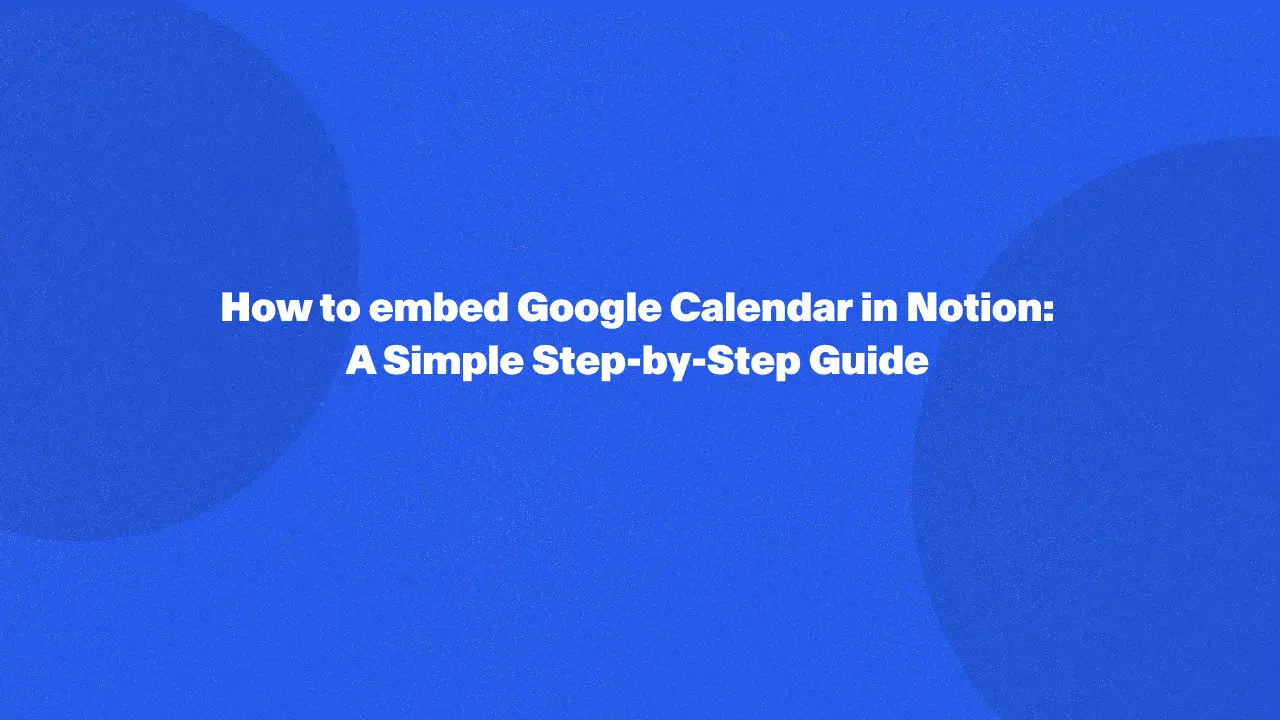
Learn How To Embed Google Calendar to Notion and streamline your scheduling and productivity in one organized space. This guide will walk you through connecting your calendar to Notion, making it simple to manage events, set reminders, and view upcoming tasks without leaving your workspace.
When you integrate the calendar, you’ll stay on top of your schedule, avoid missed meetings, and get a clearer overview of your priorities. Whether you’re aiming to optimize personal planning or collaborate seamlessly in a team environment, this process can enhance your workflow, saving you time and helping you stay organized.
Why Embed Google Calendar in Notion?
Integrating Google Calendar in Notion lets you keep all your plans, deadlines, and reminders in one spot. It’s beneficial for both individuals and teams who rely on both Notion and Google Calendar but want to simplify their workflow by consolidating tasks and appointments into a single app.
Whether you’re managing personal projects, team deadlines, or just trying to streamline your day, when you embed Google Calendar it can help you stay organized without juggling multiple tabs or applications.
Here’s why you might want to consider embedding or connecting your calendar:
- All-in-one workspace: Instead of keeping separate apps open, when you integrate calendar means you can see your tasks and meetings alongside your project notes.
- Effortless scheduling: Add Google Calendar events quickly and refer to them directly within Notion to keep your projects moving smoothly.
- Unified system: For people or teams who heavily rely on Notion, embedding a Google Calendar ensures that important dates aren’t missed, even during intense work sessions.
How To Embed Google Calendar In Notion
Embedding Google Calendar in Notion is straightforward, but it requires your calendar to be public. Here’s a step-by-step guide to get you started with embedding a calendar directly into Notion.
Step 1: Create a public URL for your Google Calendar
To allow Notion to access your Google Calendar link, you need to make it public. Follow these steps:
1. Open Google Calendar and go to the settings menu.
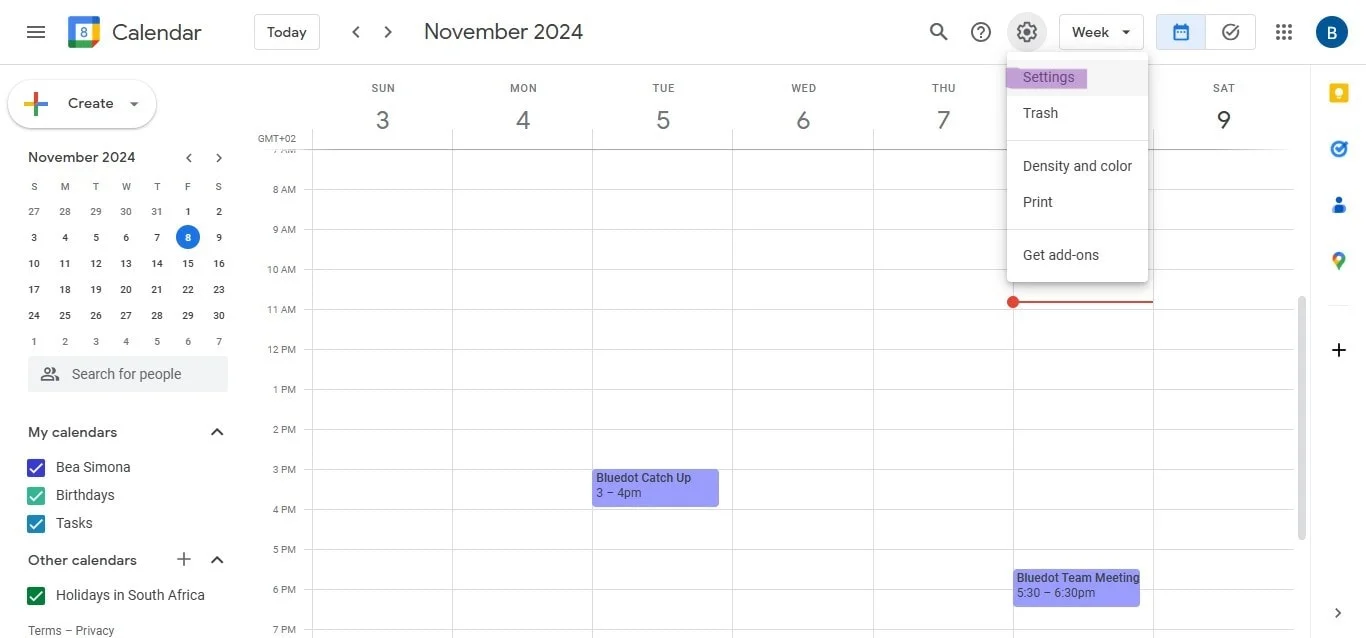
2. On the left side, you’ll see a list of all your calendars under "My calendars." Choose the one you’d like to embed.
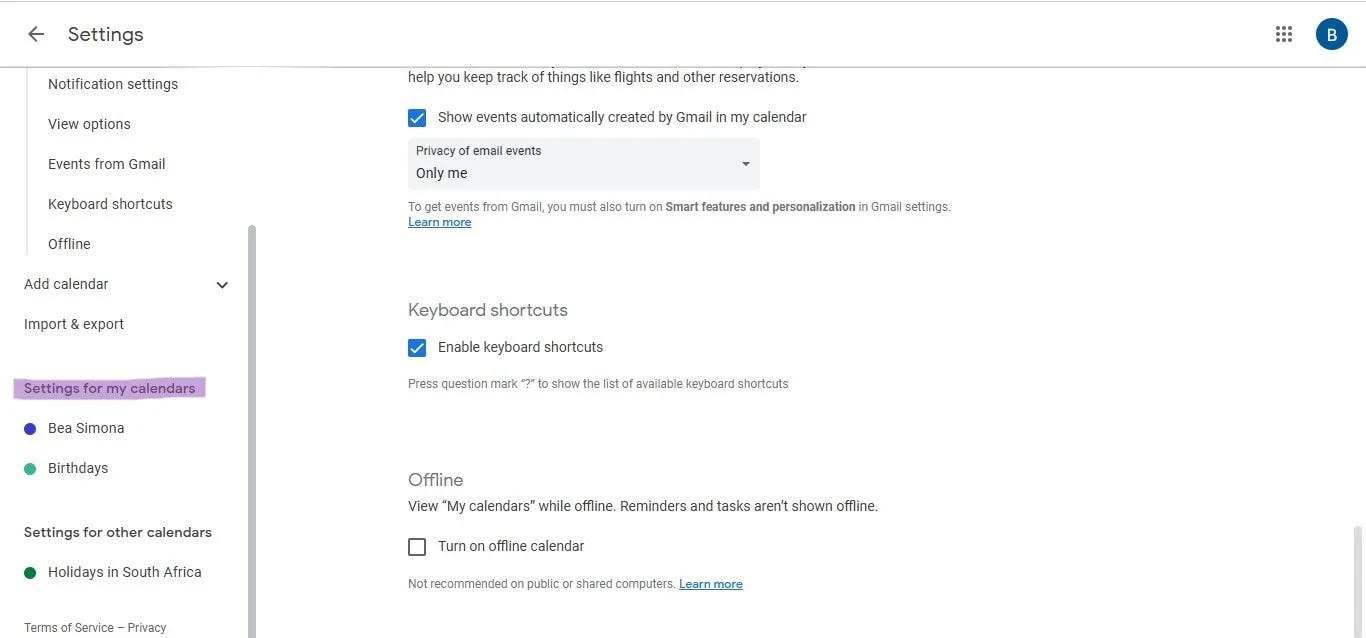
3. In the calendar’s settings, scroll down to the Access permissions section. Check the box next to "Make available to public." This setting allows Notion to access your calendar through a public URL.
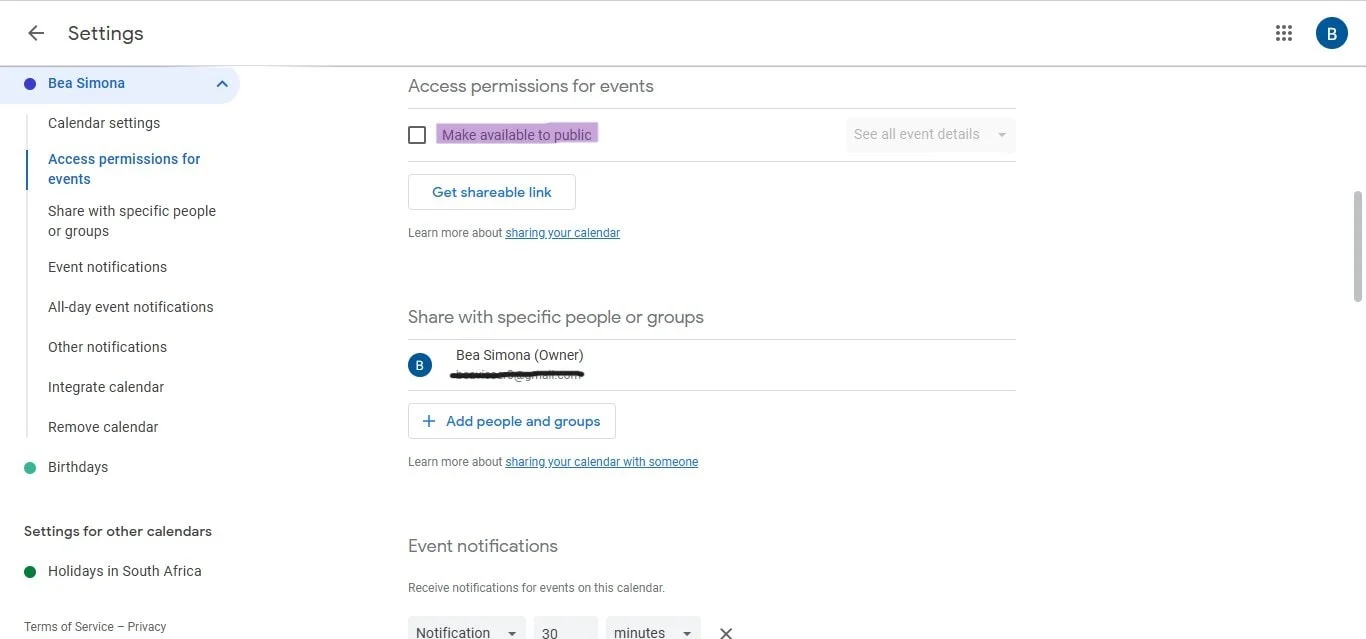
4. Click embed link (not the regular Google Calendar link). This is the link you’ll use to embed Google Calendar in Notion.
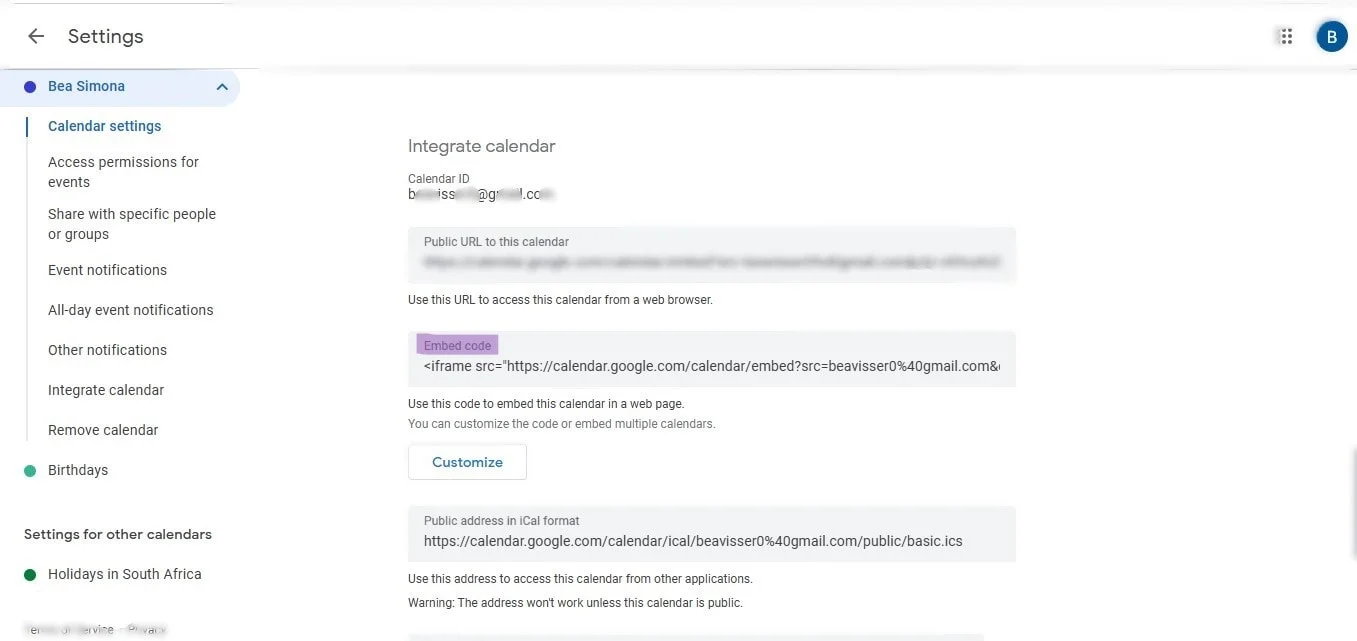
Note: Making your calendar public means anyone with the link can see it. Ensure you’re comfortable with this before continuing. Alternatively, if privacy is a concern, consider creating a separate public calendar with only work-related events.
Step 2: Embed the Google Calendar Link in Notion
Once you’ve got your Google Calendar public URL, follow these steps to embed it in Notion:
1. Open Notion and navigate to the Notion page where you’d like to add your calendar.
2. Type /embed into the page. This will open an embed link option.
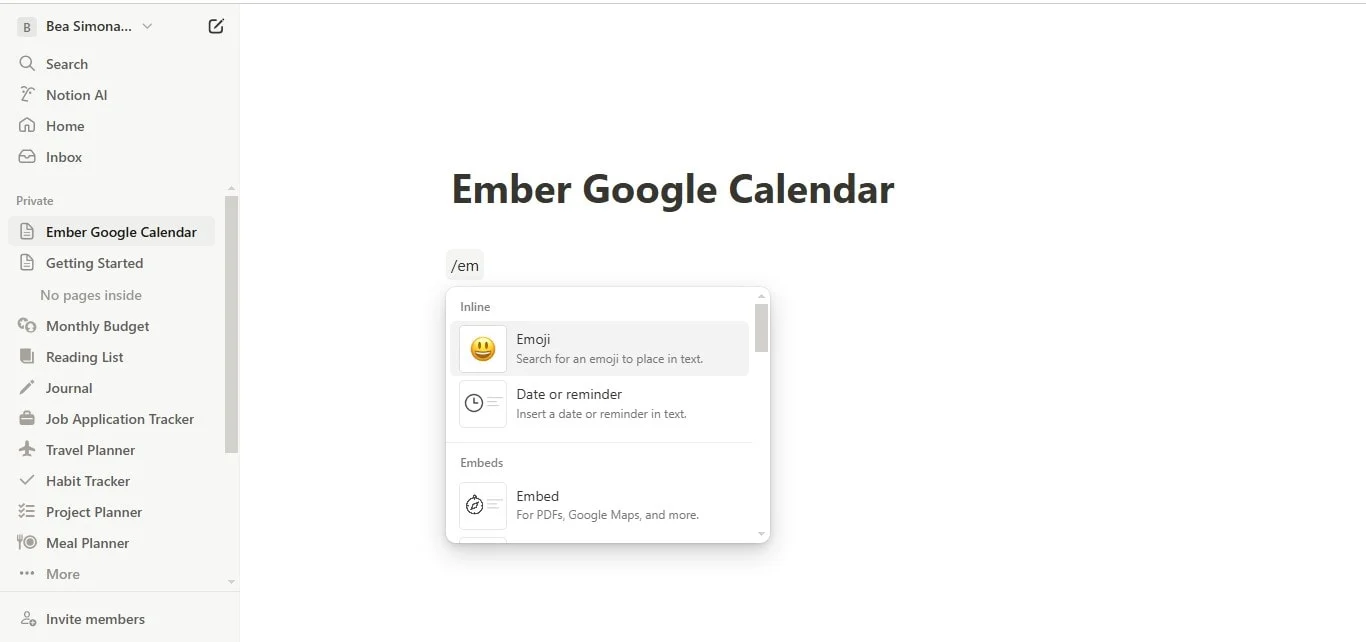
3. Paste your Google Calendar link into the embed field and click “Embed.” Notion will now display a live view of your calendar on the page.

4. Resize and adjust the view if needed to make it visually appealing and easy to read.
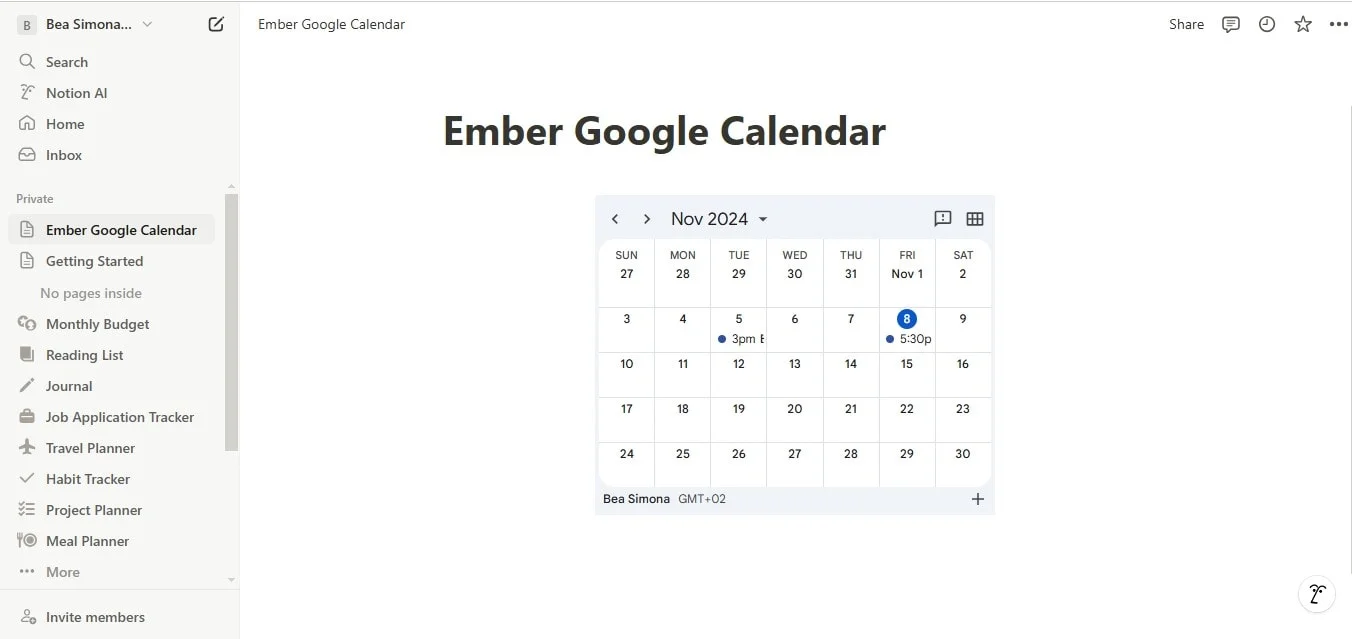
Step 3: Customize the View and Manage Calendar Settings
After you connect Google Calendar, you can further adjust your calendar view within Notion. Resize the embedded block to make the calendar more prominent, or adjust the view to display only what’s relevant. Some tips include:
- Creating a dedicated Notion page for your calendar to keep everything organized.
- Embedding multiple calendars for work, personal tasks, or specific projects by following the same steps and using separate URLs.
- Adjusting permissions for events if you’re embedding a calendar that’s shared with others.
Tips For Using Google Calendar In Notion Efficiently
To get the most out of embed Google Calendar in Notion, consider these tips:
- Embed different views of your calendar: Depending on your needs, you can embed a monthly view, weekly view, or even a daily agenda. This helps you see your schedule in the format that suits your workflow best.
- Use separate pages for specific calendars: If you manage multiple calendars, create dedicated Notion pages for each one. This way, you can keep work events separate from personal schedules while still enjoying the convenience of seeing them all within Notion.
- Set up alerts on calendar calendar: Notion won’t notify you about your Google Calendar events, so make sure you have alerts set in Google Calendar to stay on top of deadlines and appointments.
Advanced Options for Google Calendar and Notion Integration
While integrating Google Calendar in Notion is helpful, some users may want to go beyond a simple embed and create a more synchronized experience. Here are some advanced ways to further integrate Google Calendar to Notion.
Integrating with Other Apps
Besides Zapier, there are other ways to link Notion and Google Calendar with external tools to expand functionality. If you use other apps like Slack or Microsoft Teams, you can set up workflows to create notifications or reminders in these apps based on your Google Calendar events, further enhancing your workspace.
Benefits Of Embedding Google Calendar In Notion
Embedding or fully integrating Google Calendar with Notion offers several advantages that improve productivity and organization. Some of these benefits include:
- Streamlined workflow: By integrating Google Calendar, you can see your schedule directly alongside your project notes and task lists.
- Real-time updates: Integrating your calendar allows you to stay on top of any changes without switching between Google and Notion.
- Custom views and embedding options: You can adjust the view settings in Notion to prioritize specific events or timelines.
- Multi-calendar embedding: Add Google Calendar URLs for different projects or teams to keep everything in one workspace while maintaining organization.
- Enhanced access control: With access permissions, you can manage who can view or edit certain embedded calendars, allowing you to customize your Notion workspace as needed.
Limitations Of Embedding Google Calendar In Notion
Limited two-way sync functionality
One major limitation when you integrate calendar in Notion is the lack of two-way sync. While you can view Google Calendar events directly on your Notion page, any changes made within Notion won’t be reflected back in Google Calendar. To manage all your events more fully, you’ll need to switch back to Google Calendar, as Notion only supports a one-way embed.
Restricted access permissions
When integrating the Calendar, your calendar account's access permissions must be set to public. This is necessary for the Google Calendar link to work in Notion, but it can lead to privacy concerns if sensitive information is shared. While this setting enables you to display the calendar, it limits options for restricting visibility, especially if sharing your Notion workspace with a larger team.
Limited integration with different apps
Integrating Google Calendar in Notion is a basic solution that doesn't offer full integration with different apps or advanced Google Calendar features. For example, adding new events or using additional Google Calendar and Notion features, such as automatic updates or notifications, isn’t supported. You’ll still need to access your calendar directly in Google to manage any details or sync your data across many calendars effectively.
Static calendar view
The embedded view in Notion is static, which means you cannot interact with or edit events directly from your Notion page. Unlike in Google Calendar, where events are interactive and customizable, Notion only displays a read-only version notion calendar itself. This limits the flexibility of managing new events or adjusting event details without switching back to the Google Calendar app.
Dependent on public URL accessibility
When you integrate Google Calendar, it requires using a public URL from sync Google calendar. If this link changes or your calendar is made private, the embed will break, requiring you to reconnect the calendar. Additionally, while the embed code makes calendar possible i Notion, any changes to Google’s embed link structure may affect how the calendar displays in Notion.
Conclusion
Embedding Google Calendar in Notion brings together all your schedules, events, and tasks in one convenient space, enabling you to stay organized and proactive. Integrating these tools helps you keep track of key meetings, deadlines, and priorities, especially when coordinating with a team.
When it comes to capturing the details of those meetings, Bluedot is an invaluable tool. Bluedot goes beyond just transcription; it offers reliable recording of all aspects of your meetings, which is especially important during screen shares, ensuring that no critical information is missed.
With features like recording transcription, auto-generated emails, conference call transcription, automatic note taker, meeting templates, meeting minutes transcription, interview transcription software, while securely saving recordings for future reference. Additionally, Bluedot's new AI chat feature assists in pulling out key points and answers from recordings, making follow-up and collaboration even more seamless. With Bluedot, you can focus on the conversation at hand, knowing everything is captured and saved for future reference.

%201.svg)
